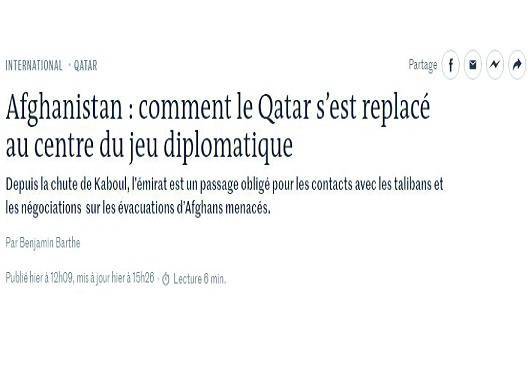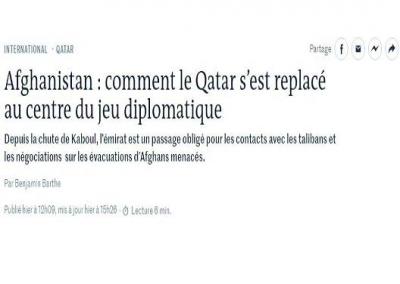The French newspaper Le Monde emphasized that Qatar is everywhere in addressing the Afghan crisis, playing a key role in both the evacuation of individuals and negotiations with the new Kabul government, alongside its efforts to contain the humanitarian crisis afflicting the Afghan people. The paper stated that the group of French Afghans who managed to travel from Kabul on Friday, September 10, owe their newfound freedom to Qatar, which reopened the airport and swiftly rehabilitated the passenger terminal that was destroyed in August. Aboard a Qatar Airways Boeing aircraft, 49 individuals with dual nationality and their family members—out of a total of 158 passengers—landed in Doha before heading back to Paris.
In turn, the British site Middle East Eye noted that Qatar has become the intermediary between the United States and the Taliban. Its efforts have garnered headlines, positioning it as a negotiator with a history of mediating several crises in Lebanon, Yemen, and Sudan.
The newspaper reported that among the 124,000 Afghans and foreign nationals who fled Kabul since the fall of President Ashraf Ghani's regime in mid-August, half of them passed through Qatar, undergoing COVID-19 checks, shelter, food, and medical care at Qatar's expense. Qatar opened its borders to tens of thousands of evacuated individuals and utilized complexes built for the 2022 FIFA World Cup.
Additionally, the Qatari ambassador in Kabul personally escorted many US nationals to the airport. The report highlighted that in appreciation for Qatar's efforts, US Secretary of State Antony Blinken, alongside Defense Secretary Lloyd Austin, visited Doha to officially announce that "the men, women, and children who traveled this route will not forget what Qatar did at this precarious time in their lives, and we will not forget it either," asserting that "the partnership between the United States and Qatar has never been so robust."
In this regard, Sultan Barakat, director of the Conflict and Humanitarian Studies Center in Doha, stated that "the Taliban has been influenced by its communication with the rest of the world since settling in Doha," noting that Qatar has no interests in Afghanistan unlike other countries, and therefore did not seek to influence negotiations, thus creating a favorable space for dialogue.
The author concluded that Qatar’s communication channel with the Taliban has gained appreciation, and its ability to engage both Islamic movements and Western advisers simultaneously is now seen as a political asset, following a period during which it was described by critics as a "double game."
In summary, Middle East Eye reiterated that Qatar has become an indispensable mediator between the US and the Taliban, prominently featuring in headlines as an active negotiator in the Afghan dossier, building on its history of mediation in various crises in Lebanon, Yemen, Sudan, and beyond. This role has been regionally developed, enhancing Qatar’s reputation in providing assistance for international crises, which is one of its foreign policy goals.
According to the report, Qatar aimed to achieve reconciliation in Afghanistan by facilitating negotiations between the Afghan government and the Taliban. The Taliban has made it clear, both publicly and privately, that it will only operate through Qatari channels. Qatar's diplomatic role has surged with the transition of the US and many European Afghan embassies to Doha, alongside US Secretary of State Antony Blinken’s commendation of Qatar's efforts and ongoing role as a communication channel, marking a significant achievement in political relationships.
Beyond the headlines, the goodwill fostered by Qatar's role in Afghanistan suggests that the door to lucrative Western investments—possibly in Afghanistan—remains wide open. Perhaps more importantly, there is a sentiment that Qatar will be more secure in any future crisis, as it now enjoys substantial relationships with major powers.




